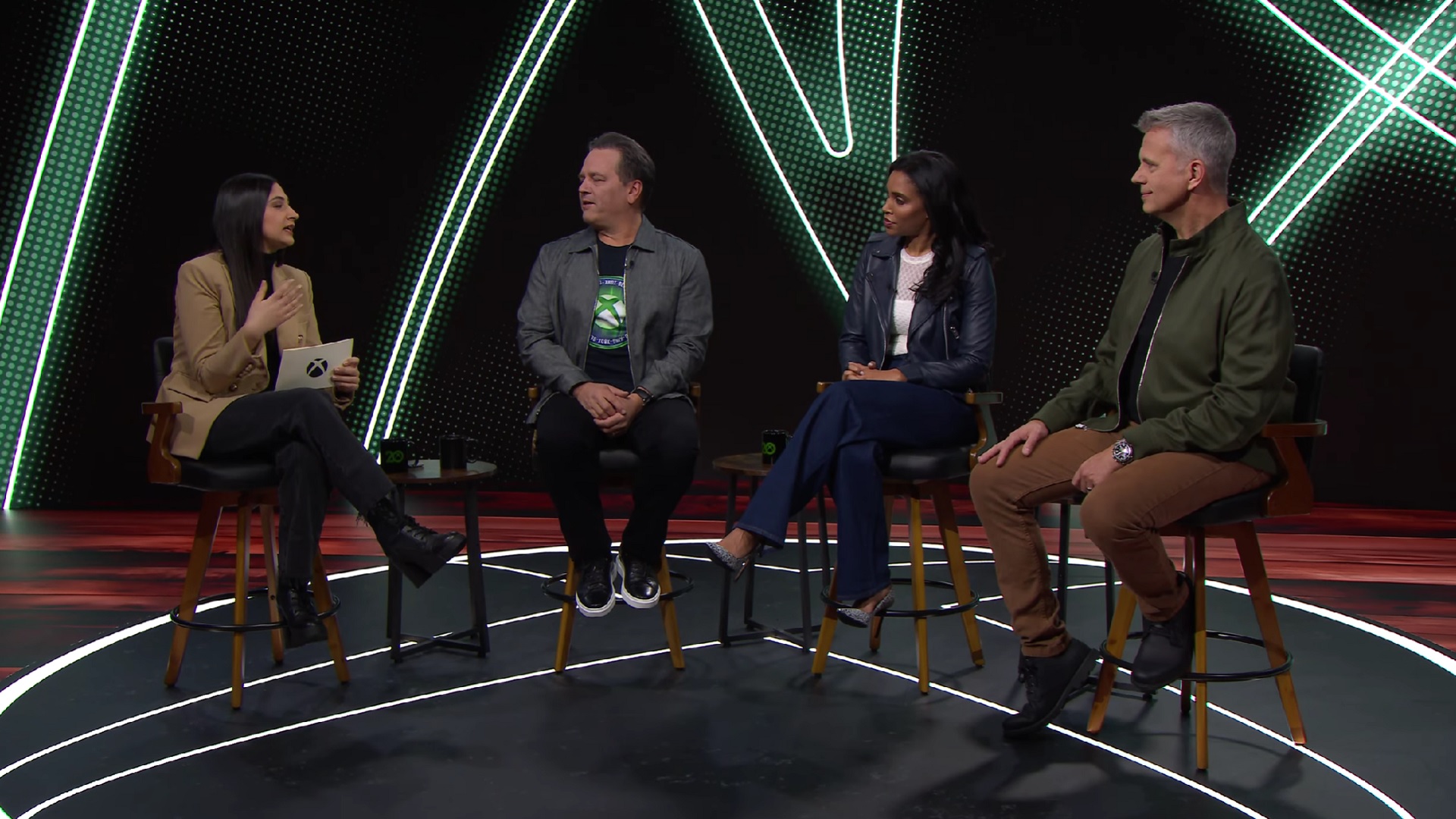
Can "no red lines" live alongside "case by case basis"? That's what some Xbox fans are asking today. A new interviewed poured some fresh intrigue onto the ongoing controversy of Xbox's multiplatform games strategy, codenamed "Latitude."
Earlier in 2024, Microsoft revealed that it planned to bring Sea of Thieves, Pentiment, Grounded, and Hi-Fi Rush to arch-rival PlayStation. At the time, Microsoft said the plans were for those four games only, until it wasn't. This past summer, it was revealed rather unceremoniously that Xbox's big console exclusive for the winter, Indiana Jones and the Great Circle, was in fact not exclusive at all. The game is coming to PlayStation in the Spring of 2025, with many wondering if this hints at further plans.
Naturally, many Xbox fans wonder if iconic games like Halo, Forza, or Gears of War could eventually hit PlayStation too. It's been a bitter pill for many, given that Spencer himself testified under oath during the Activision acquisition that PlayStation uses the funds it gets from Xbox's games that are already on PlayStation, like Minecraft, to cut timed exclusivity deals that harm Xbox as the challenger platform. Sony's first-party output was relatively light this year, but it had a ton of success regardless thanks to publishing deals with games like Helldivers 2, and the timed third-party console exclusive Black Myth Wukong.
Xbox lead Phil Spencer reiterated a few weeks ago that there were "no red lines" regarding what games could eventually go multiplatform. I literally wrote "Microsoft is pushing for no red lines" when I outlined what I'd heard about Latitude internally back in May. Although I did also note on my XB2 Podcast just recently that Microsoft also views its multi-platform strategy through a case-by-case basis lens. Matt Booty recently described the strategy as such during an internal town hall meeting, where as-of-yet unseen Fable combat gameplay was also presented to staff (it looks awesome, by the way.) Indeed, it's not the first time the phrase "case by case basis" has been used as such, even publicly, but Booty reiterated them again in a recent interview.

Speaking with Variety, Xbox's games lead Matt Booty offered a statement that some have taken to be contradictory, based on Xbox CEO Phil Spencer's recent comments about "red lines."
Xbox fans are scrambling to figure out what these below statements mean for a variety of reasons. And sure, some just seek more console war fodder, treating PlayStation vs. Xbox as some kind of sport. However, others are concerned about what it could mean for their Xbox game libraries long term. If Xbox gives way to PlayStation vacuuming up its market share on console, what would happen to all that digital content Microsoft has locked us into? Google took a write-down and refunded customers to the tune of millions of dollars on Stadia's closure. Will Xbox be in a position to refund customers billions of dollars if Xbox were to close down? Likely not. So, for customers to have a vested interest in Xbox's direction makes total and complete pragmatic sense.
And that's where the confusion comes in, because Xbox hasn't exactly been definitively clear about what Xbox's direction is, and perhaps more importantly, how its "This is an Xbox" strategy can be, or even deserves to be successful. Partially, this is because it's trying something unprecedented and new. Partially, it's because Microsoft is genuinely historically awful at messaging. Microsoft has built up decades of unease about its apparent dedication (or lack thereof) to consumer products. Microsoft is slowly intentionally killing its Surface hardware department, for example. And it's not like Surface wasn't successful; this was once a multi-billion dollar segment for Microsoft. Xbox customers wonder if gaming at Microsoft will eventually suffer the same fate, hence the nerves among those who are actively paying attention.
So for fun, let's try and read the tea leaves on Matt Booty's comments.
"We are very much making the [exclusivity and windowing] decisions on a game by game basis," Matt Booty said. As noted, this isn't out of step with what Microsoft has previously said. But is it taking Spencer's "red lines" comment out of step? I'd say no.
The "case by case" reality isn't so much because of some philosophical red or green line, but more so the real-world reality that many of Microsoft's teams are just not set up for simultaneous multiplatform development — at least yet. Many of them don't have PlayStation dev kits, many of them don't have the personnel, or even a relationship with Sony. Ports will likely still happen, but it'll be after the fact. For many studios (at least for now), simultaneous multiplatform development is not in the budget, and that's what Matt Booty is describing here.
Booty explains. "And each of our studios is in a little bit of a different position. There’s also the production timeline on a game, so the decision on spacing comes there first. We want to make sure there’s a great experience for our Xbox players. And then the gap between [when it becomes available on PlayStation] is as much a production decision as it is anything else. [Indiana Jones] was a game that was in production before we acquired Bethesda, even."
In an algorithmic world where hype drives trending content which thus drives conversation, having your content available in as many places as possible is desirable for creators. Cutting through the zeitgeist is almost as important as making a good game from the outset, especially when competition for dwindling playtime hours has become so ferocious. Multiplatform game companies simply have a huge advantage, which is why companies like Square Enix and others have moved away from platform exclusivity.
Reading the green tea leaves

When Microsoft initially acquired Bethesda, the firm spoke up about how the acquisition was about exclusives, and reiterated as much under oath during the Activision-Blizzard trials. Starfield has thus far been Xbox exclusive, but Bethesda and its subsidiary studios are historically multi-platform teams. Focusing on one platform has its benefits, particularly for a platform holder like Xbox, who isn't ready to abandon home console hardware just yet. But, like Indiana Jones, Starfield likely will eventually make its way to PlayStation, even if it's not confirmed just yet.
Other teams at Microsoft have historically never brought games to PlayStation. So would either need to invest in that expertise internally, or get port studios involved. It's not as expensive as it once was to port games between platforms, now that everything is on an x86 structure underneath, but it's still no trivial task. There's platform considerations to make, legal and contractual obligations to check, retail relationships to set in stone, and so on. There are tons of moving parts when it comes to building games, and that invokes costs — even when bringing games to your own platform.
READ NEXT: On Xbox's strange future.
Still, I firmly believe personally that the cost for Microsoft will be truly massive if they completely give in on developing and pushing their own home-grown platform. Losing the industry-wide clout that comes with being a platform holder would give the keys to competing tech companies to shape the destiny and future of the industry. It would force Xbox's large and unwieldy publishing arm to bow down to the whims of companies that aren't always historically friendly. Microsoft's failure to get a mobile game store set up on Apple and Google's mobile duopoly should serve as a wake up call for what it could mean if Xbox stops trying to curate its own hardware endpoint, even if Microsoft's corporate layer seems to despise investing in hardware.
So in essence, how I'm interpreting the situation is thus: there are no philosophical red lines at a high level over what games could be considered for a multiplatform version in the future. But, there are short-term case-by-case production realities that could prevent studios from hitting PlayStation day and date, whether the reasons be budgetary, logistical — or perhaps even strategic.







